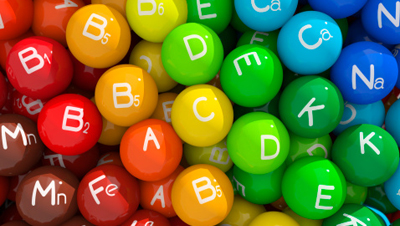
You’re a healthy person. You eat plenty of fruits and vegetables every day and take your vitamins. You exercise bright and early, four to five times a week, and you are always health conscious about the new trends on keeping healthy and staying fit.
However, have you considered that the vitamins you are supplementing with actually aren’t keeping you healthy?
It’s important to remember that not all vitamins are created equally—and the biggest problem is synthetic vitamins. Uneducated media might promote the dangers of vitamins without signaling out the synthetic kind. Cheap synthetic vitamins are disguised and marketed as what your body needs—but what are they doing in your body?
Published research on synthetic vitamins and other unnatural nutrients has come to two very important conclusions: they are mostly ineffective in preventing disease, and they may also lead to death.
There are major differences between whole food based vitamins and their synthetic adversary. The nutrients from synthetic supplements are man-made and developed in the lab, and although they have the same chemical structure as whole food derived supplements, the results aren’t equal.
Beware of Common Synthetic Vitamins
Many commercial synthetic vitamins contain chemical ingredients. Be sure to read your labels wisely because the synthetic vitamins make up 98% of the products available on the shelves. The label will contain these suspect factors:
- If a natural food source is missing from the ingredient list, it was synthetically derived.
- Ingredients ending in “ate” or “ide” contain synthetic salt forms. Products that begin with “dl” are also synthetic.
- Watch for salt synthetic ingredients such as acetate, chloride, or gluconate. They are added to make the vitamin or mineral more stable.
Beware of these synthetic vitamins on the market today:
1. Vitamin C
It’s fairly well known that vitamin C is one of the most highly processed vitamins you can buy. Taking high dosages of synthetic vitamin C daily can impair your energy systems and have adverse effects on the antioxidant system. Watch out for the synthetic ingredient “ascorbic acid.”
Avoid the chemical vitamin C form, alpha-tocopherol, and when the product includes “vitamin C,” it’s probably the synthetic kind. Purchase your vitamin C derived from natural or food forms, such as supergreens and superfruit powders, and capsules or drink forms of raw food based multivitamins.
2. Vitamin B
There are many synthetic B vitamins on the market. The synthetic B vitamins will usually be referred by several synthetic names such as thiamine (B1), pyridoxine (B6), or cabalamin (B12).
Naturally active B vitamins can be found in health food stores and will go by names such as thiamin pyrophosphate (B1), pyridoxal-5-phosphate (B6), or methylcobalamin (B12).
3. Vitamin D
There is a variety of synthetic vitamin D such as calcitrol and calcipotriene—however, in high amounts, all vitamin D is toxic. Ergocalciferl (D2) from plants, and cholecalciferol (D3) from animal sources, are active forms of vitamin D, similar to the sunlight version.
4. Vitamin E
Some vitamin E on the market may also be genetically modified, and the tocopherol could be derived from corn, soybeans, cottonseed, rice, or wheat germ oil. Tocopherol is vitamin E’s chemical name, and can be seen on at least seven different types of the vitamin.
Cheaper vitamin E supplements are camouflaged as d-alpha tocopherol. Petro chemically-derived vitamin E has toxic effects, and men taking 400 IUs per day can increase their risk of prostate cancer.
5. Processed Foods
Take a look your cereal, snack bars, yogurt, or other processed foods and you notice that it says it’s a source of essential vitamins and minerals. These are most likely synthetic ingredients.
What Are Natural Vitamins and Supplements?
Watch out when the vitamins are labeled as “natural.” It can say natural even if they contain as little as 10% of their natural form, which means it also contains up to 90% synthetic chemicals. Products that contain 100% plant-based ingredients are the best vitamins.
Flax oil (alpha-linolenic acid), fish oil (containing EPA/DHA), and vegetables or fruit concentrates are natural supplements, made from unheated freeze-dried real food. However, most dried vegetable and fruit concentrates in dietary supplements are destroyed of nutrients from very high heat.
What About Minerals?
Every mineral supplement is natural because they’ve come from the sun, although high dosages can make minerals dangerous. Avoid mineral doses that are five to 10 times above daily values, and minerals with lowest bioavailability such as the chlorides and oxides.
The next time you’re in the supplement aisle, check the vitamin ingredients thoroughly. Avoid synthetic vitamins and purchase the best vitamins, allowing your body to run at its optimal best health.
Related:
- Vitamin B12-Rich Foods for Vegetarians
- Link Between Vitamin D Deficiency and Diabetic Retinopathy: Study
- Vitamin D May Help Treat High Blood Pressure, Study Contradicts Earlier Research
Sources:
Jockers, D., Dr., “Understand the difference between synthetic and whole supplementation,” Natural News web site, April 13, 2011; http://www.naturalnews.com/032058_synthetic_vitamins_supplements.html.
Maffetone, P., “Serious Dangers of Synthetic & Unnatural Vitamins,” Philip Maffetone web site, 2008; http://content.bandzoogle.com/users/cippianhotmail/files/Dangers_of_Synthetic_Unnatural_Vitamins.pdf.













